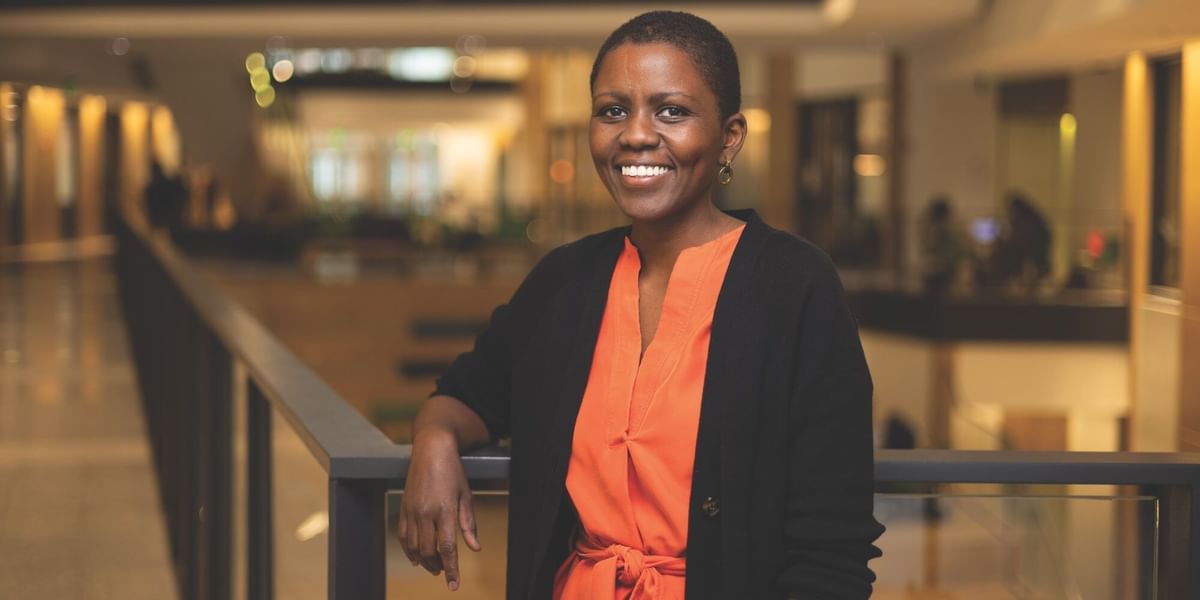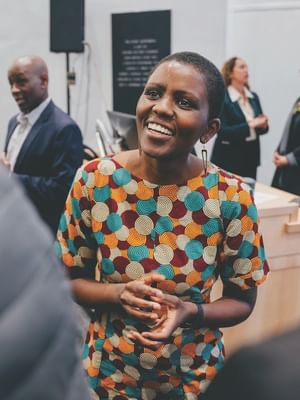- Undergraduate
Bachelor's Degrees
Bachelor of ArtsBachelor of EngineeringDual-Degree ProgramUndergraduate AdmissionsUndergraduate Experience
- Graduate
Graduate Experience
- Research
- Entrepreneurship
- Community
- About
-
Search
All Thayer News


Rose Mutiso's Path to Impact
May 21, 2024 | by Theresa D'Orsi | Dartmouth Engineer
Rose Mutiso '08 Th'08 connects academic rigor and societal relevance as research director at Energy for Growth Hub. She is bridging the spaces her parents occupied—the science her father pursued as head of the geography department at the University of Nairobi and the government policy her mother influenced as a technical officer in the Kenya Ministry of the Environment. With a PhD in nanotechnology and experience as a senior fellow at the US Department of Energy, she can serve as translator in the global discussions around energy. It's a role she also hopes to make more accessible to female doctoral candidates in East Africa with the Mawazo Institute, a Nairobi-based nonprofit she cofounded with Rachel Strohm '08 to empower more homegrown experts and policy leaders.
As Mutiso says: "Any kind of revolution requires deep, deep investments now to create the ecosystem to support whatever futures we have in mind." For her work, Mutiso earned the 2023 McGuire Family Prize for Societal Impact, a prestigious award that recognizes individuals in the Dartmouth community who have significantly improved the course of humanity, society, or the environment.

Rose Mutiso '08 Th'08 (Photo by Rob Strong '04)
What about your role at Energy for Growth Hub invigorates you?
I'm trained as a scientist and an engineer, but because of my liberal arts background, I also have a strong interest in society, on making an impact. My job is connecting evidence and research to inform policy and decision making around energy, energy poverty, and energy transitions in poor countries. These are all topics that have strong technical underpinnings, so when you think about what energy technologies are most relevant to different geographies, how do you deploy them? What different conditions are needed?
We have a network of fellows and experts, and I spend a lot of my time talking with folks in academia who are experts in their field—what is new or interesting about what they're working on and how can we explain it to general audiences and then think about what the policy audiences care about. Whatever kind of niche technical work people are doing, my job is to be a translator and pull those ideas into civic policy discussions anywhere policymakers, executives, or everyday people are thinking about energy futures. I'm trying to bring the best thinking, the best knowledge to bear in those conversations.
Do you find there are messages or ideas that seem to resonate more?
Around the issues I work on—energy, poverty, climate change and its impact—I think there's a lot of techno-optimism, where a lot of people feel technology will solve problems. It's what every technologist wants to hear, because for a long time, people forgot about science. After all the years of antiscience sentiment around climate or renewables bashing, I think we've made a lot of progress. Now there's a lot of optimism around technology as a crucial tool. People understand progress has been made in the technological sphere that is making our odds stronger.
I'm excited about that, but part of my job is to bring to everyone's attention the nuanced details that get lost in these sweeping, rosy narratives, especially in Africa. There's this idea that we'll leapfrog the problems of the West and have this bright new future, that we'll never have any dirty energy and everything is going to be great. I welcome the interest in technology and science and evidence and, while we have everyone's attention, try to help folks understand that there's no silver bullet.
The danger if we leave these sweeping techno-optimistic narratives to spread unchecked is when the paradise doesn't arrive immediately, people can lose faith in the science. Everyone's really excited for this new world where all of our power will be green, we'll all drive electric cars, and it's problem solved. That can backfire if we don't draw attention to things outside of technology that help our ability to achieve this vision. What's the political landscape? What about the financial flows or investments? What equity issues are important? For example, in a place such as the United States, there are winners and losers of this new future. You know, what happens to the coal miners left behind? These things can be managed, but it's important to draw attention to the complex issues around the future of energy and the future of our economies, so we are tempering expectations and anticipating all these multifaceted dimensions and solving for them now.
Africa's energy future is framed as a "debate"—is discussion a better word to use?
On one hand, I think debate is a healthy thing for any society. We all have to negotiate the communal space we're inhabiting. I think it's possible to have healthy debates on any number of things, but on energy, we have come from a kind of toxic background, where you hear solar is nonsense and you're either a booster or you're not. We need to frame it in terms of trying to find the best set of options that lead to the best outcomes.
One of our fellows with the Energy for Growth Hub is a Scottish woman named Hannah Ritchie, who just published a fantastic book called Not the End of the World. She's a hard data scientist and a big part of her mission is to talk in a solutions-oriented way that is not partisan. My role is adjacent to Hannah's, in that a big part of my job is to look at how with specificity, which means thinking about a particular place and those stakeholders, their ambitions and realities, what they're trying to optimize for, what pathways are possible, and what constraints are at play.
I think there's a role for different narrative types. There's rousing, visionary rhetoric that sets up the North Star, that mobilizes people and sets the vision for what is possible. Then the challenge is how you connect the momentum built from that to action on the ground. A lot of a career and a life is balancing between those two. If you're thinking about a path to impact, you need a little bit of both the visionary leadership and the doers.

Mutiso after receiving the 2023 McGuire Family Prize for Societal Impact. (Photo by Robert Gill)
Can you point to any ideas that are bright spots ahead?
One example I find exciting is from Kenya, and it's one that has deep roots. When I was growing up in Nairobi in the 1990s and into the early 2000s, it was in perpetual power crisis. We had rationing, power cuts, the grid would collapse—it was a power sector in shambles. Then, in the late 2000s and into the 2010s, there was a massive shift in its power sector—we were able to bring on board geothermal power, which displaced more unreliable hydro and expensive backup plants. Geothermal is now the foundation of our power sector. It's a massive success story that checks many boxes: It's green, it's affordable.
But building these power plants is not something that happens overnight. The history of the geothermal revolution is so deep, with investments in geological exploration decades ago around the time of independence. It's an inspiring example of a solution to an entrenched problem, but it also gives me pause because all around I can see the ways in which we are not planting the seeds. The changes we want to see in the next decade require investments now, not just in the infrastructure but also in the know-how. Any kind of revolution requires deep, deep investments now to create the ecosystem to support whatever futures we have in mind.
That brings us to the Mawazo Institute. It seems you're already investing in a solution.
I think expertise and investing in thinking and foundations are crucially important. When I first edged my way from the lab into energy tech policy in Washington, DC, I started working on US energy and science policy and then found such a contrast when I moved into policy and technology issues in developing countries. When there are debates around science policy in the United States, there's such a rich knowledge ecosystem that everyone is drawing from. Academics have been studying the issue for a long time. Interest groups have been advocating, pushing, and doing their own research. There are lobbyists in the mix. The passage of the Inflation Reduction Act, which is the most important climate legislation in the history of the United States, is a great illustration of the long path to a landmark decision. There were all these different ideas and voices that shaped and strengthened and negotiated a compromise position.
But then in the international space, a lot of these decisions are driven by development agencies, the World Bank or USAID or whatever, and they are made much more unilaterally. Somebody in Washington, DC, thinks some thoughts and decisions are made quickly and away from the context. I found there are very few Africans or local people involved in that decision making. I would often find myself one of the few African women in these spaces where people are strategizing around investments in energy or poverty, you name it.
Rachel and I were interested in what would happen if more Africans, in particular women, are able to build careers as experts and leaders. We wanted it to be possible for women in the country to have global reach and influence and to do their bit to lead world-class scientific investigations. Mawazo's fellowship program provides seed funding for research, conference travel, supplemental training, and mentorship. Our hope is that women early in their research careers will shape important conversations about the future of their societies.
What else is on your desk right now?
One of the projects is around the green hydrogen economy, which is a very buzzy topic in energy and climate circles. Hydrogen made from renewable energy is a way to displace fossil fuels in many parts of our economy that are hard to decarbonize, and many African countries are excited about the prospect of taking advantage of renewable energy endowments. Being a first mover in this space could have massive upside, but the kinds of investments needed to put down a stake in the future hydrogen economy are massive. It's a risky gamble. When African countries are weighing whether to go big on this, we need smart people around the decision-makers in government and industry who help them weigh the tradeoffs and are providing credible, rigorous advice in a complex and highly uncertain environment. If you don't have people in your country who understand your context—and are able to adapt the science and temper it with understanding of the realities—you're making decisions blind that could have big, big ramifications.
We're in this moment where the local and the global have to intersect. I think the issues we're facing—everything from energy to AI—require people who are both deeply rooted in a strong local context and globally connected to solve problems together and share and learn from each other. These interconnections are necessary to seed and spread the knowledge and ideas for the many problems we are solving now and into the future.
For contacts and other media information visit our Media Resources page.
